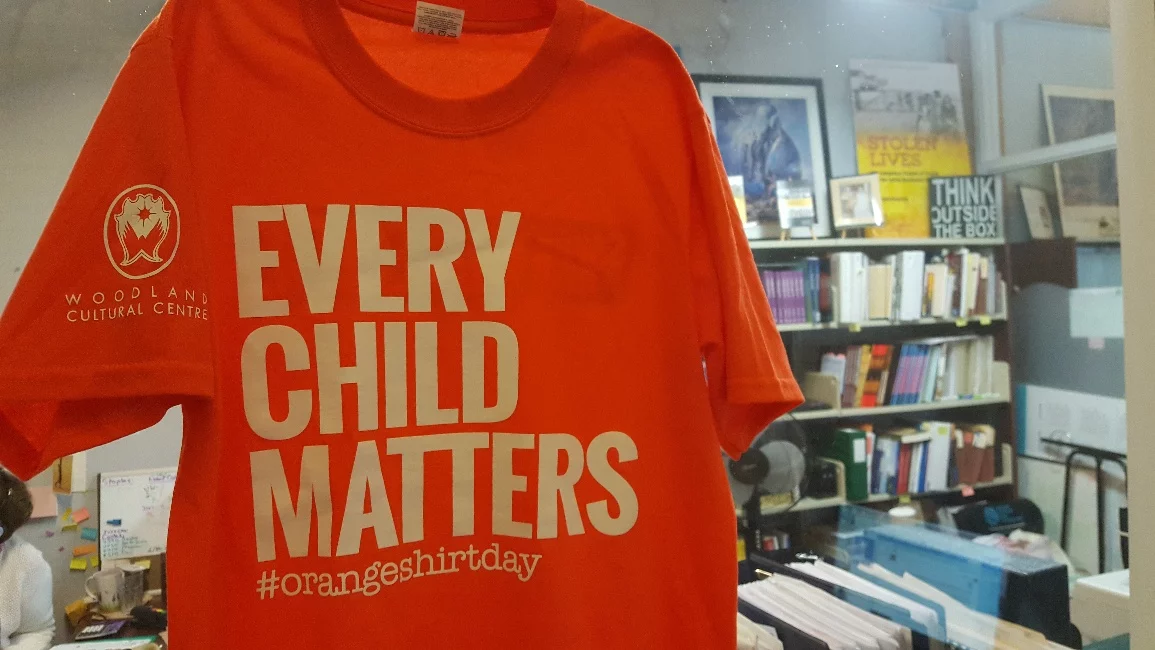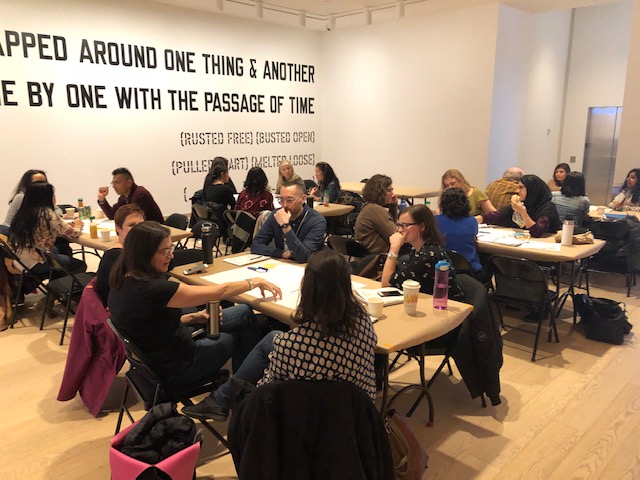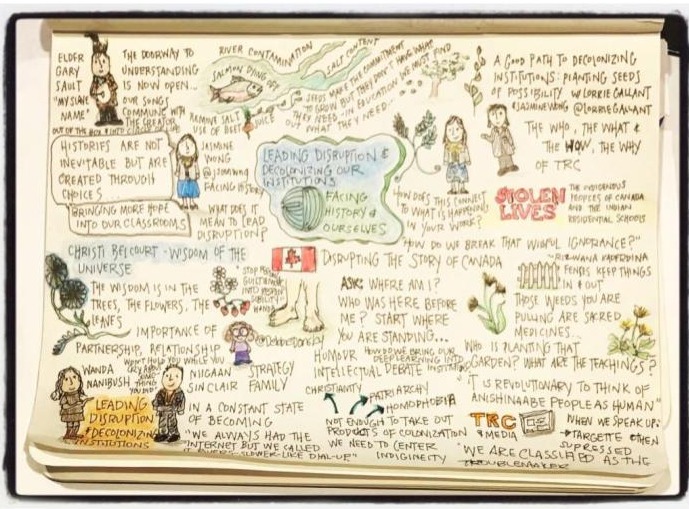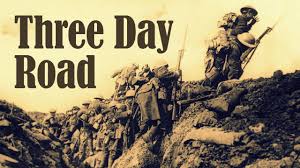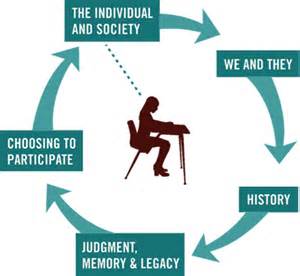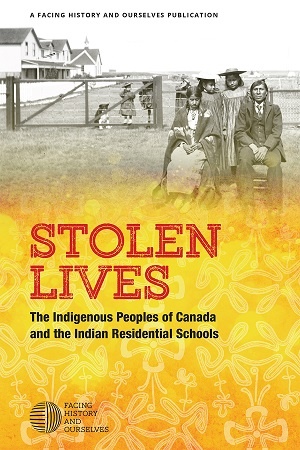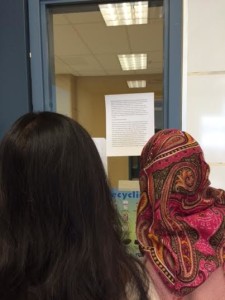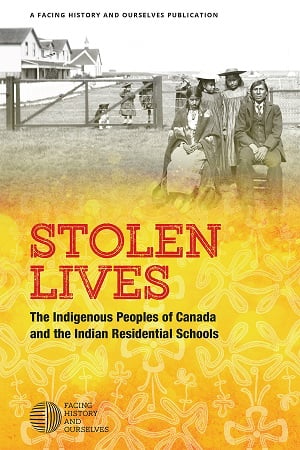some words before the video
As your school commemorates Orange Shirt Day this year, we hope these 5 resources and teaching ideas will equip you to teach your students (and colleagues) about Canada's Residential Schools, and inspire and empower students to create a meaningful response.
Read More
Topics:
Choosing to Participate,
Teaching Resources,
Truth and Reconciliation,
classroom lesson,
Indigenous,
Lesson Ideas,
stolen lives,
Orange Shirt Day,
cross curricular teaching and learning
On March 31st, 2019, Facing History and Ourselves in collaboration with the Art Gallery of Ontario partnered with Durham District School Board, Kawartha Pine Ridge District School Board, Peel District School Board, Toronto District School Board, Toronto Catholic District School Board and York Region District School Board to host a day long educator conference to discuss ways educators and institutional leaders have worked, and can work to decolonize and Indigenize education.
Read More
Topics:
Indigenous,
Decolonizing Schools
A Response to: Leading Disruption & Decolonizing Our Institutions: Facing History & Ourselves
Read More
Topics:
Truth and Reconciliation,
Indigenous History,
Culturally Responsive and Relevant Pedagogy,
Indigenous,
difficult conversations,
trc,
stolen lives,
settler eucators,
Treaty,
Sacred Circle Teachings,
Decolonizing Schools,
Facing Canada
In my grade 10 Canadian history class, I often used excerpts from Joseph Boyden’s Three Day Road to explore what life was like for soldiers during WWI. In this novel, protagonist Xavier Bird returns to Northern Ontario in 1919 after fighting in France and Belgium. He is met by his aunt Niska, an Oji-Cree woman, and the two travel back to their village. On this journey, the two recount traumatic experiences from their past - Xavier as a soldier returning from the front and Niska as a survivor of residential schools.
Read More
Topics:
Canada,
Canadian History,
Truth and Reconciliation,
Indigenous History,
Book,
Indigenous,
English Classroom,
big paper,
English,
Grade 10 History,
CHC,
difficult conversations,
trc,
stolen lives,
settler educators
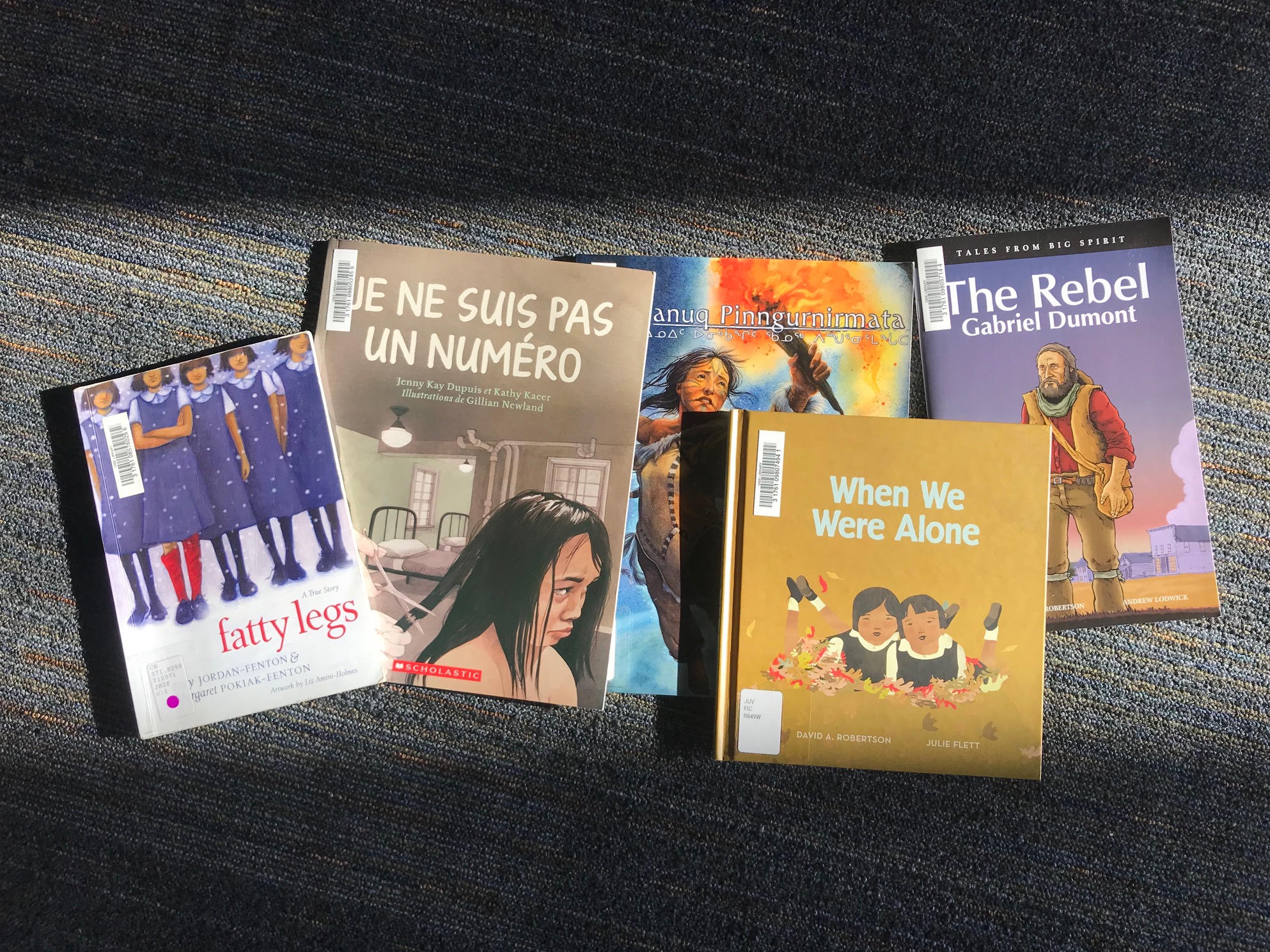
A sampling of Indigenous authored resources for K-12 classrooms from the OISE library. [Photo courtesy of Desmond Wong.]
In a talk titled, What is Reconciliation, Chair of the Truth and Reconciliation Commission, Senator Justice Murray Sinclair, reflects:
“It took us a long time to get to this point, in terms of the relationship between Aboriginal people and this country. Seven generations of children went through the residential schools. And each of those children who were educated were told that their lives were not as good as the lives of non-Aboriginal people of this country. They were told that their languages and culture were irrelevant...at the same time that was going on, non-Aboriginal children...were also being told the same thing... So as a result, many generations of children...have been raised to think about things...in a way that is negative when it comes to Aboriginal people. We need to change that.”
Including Indigenous voices, worldviews and resources into classrooms throughout Canada is an essential part of that change. In doing so, it is equally essential to bring a breadth of resources into classrooms so students encounter a diversity and depth of lived experiences. The following post, written by Ontario Institute of Studies in Education librarian, Desmond Wong, helps us to do that.
Read More
Topics:
Books,
Canada,
Best of...,
Indigenous
When I graduated from teacher’s college, my goal was to teach high school music and history. I wanted to have discussions about the people and choices that shape society, the injustices of the past, and the levers that we have to create change. I spent a year supplying, and then in 2014/2015 I was got a position - much to my surprise - in a grade one classroom, and the following year, in a grade five/six split classroom.
Read More
Topics:
Art,
Books,
Indigenous,
LGBTQ
It’s playoff time! Toronto is welcoming the Cleveland Indians for the American League Championship Series, and things are stirring on social media. Why hasn’t Cleveland changed their name? For years, they’ve been using culturally insensitive names; and as Canadians, we can no longer stand by the degradation of Indigenous culture and beliefs.
Read More
Topics:
News,
Canada,
Truth and Reconciliation,
Indigenous History,
Indigenous,
trc
As part of Facing History and Ourselves three day summer seminar "CHC2 Canadian History through a Facing History Lens", Nathan Tidridge came to speak about "Creating a Culture of Caring Through Reconciliation as Non-Indigenous Teacher."
Nathan Tidridge teaches at Waterdown District High School and was awarded the Premier’s Award for Teaching Excellence (Teacher of the Year) and the Charles Baillie Award for Excellence in Secondary School Teaching by Queen's University. The author of four books exploring the Crown in Canada, Tidridge's latest work (The Queen at the Council Fire: The Treaty of Niagara, Reconciliation and the Dignified Crown in Canada) was launched by the Canadian Museum for Human Rights. Over the years Tidridge has spoken to numerous groups across the country, including recently the Manitoba Council of Elders, and The Crown in the 21st Century conference held in Victoria. In 2015 he was proud to be appointed to both the Ontario Heritage Trust Board of Directors and the National Advisory Council of the Prince's Charities Canada.
If you were unable to attend and would like to see the talk it was streamed and can be accessed on Periscope.
Following the event I had a chance to catch up with Nathan and talk to him a little bit about his experiences teaching difficult content in the highschool classroom. Whether or not you were able to attend this great talk, take a look at the following interview and consider the following:
1. How could you use the information in this interview to better your own teaching practice?
2. How might this interview help you contextualize the importance of addressing the TRC calls to action for your department and school?
3. How could the interview be used to help inspire and build confidence in educators to incorporate Indigenous Studies into their classrooms?
Read More
Topics:
Teaching,
History,
Canada,
Indigenous,
CHG,
CHC
Bringing Indigenous Voices into the Classroom
In December of 2012, I visited the Woodland Cultural Centre and former Mohawk Institute in Brantford, Ontario for the first time. This visit had a lasting impact upon my understanding of the residential school system in Canada. Subsequently I asked myself, how could I further embed Indigenous history into my courses?
Read More
Topics:
Choosing to Participate,
Facing History Resources,
History,
Canada,
Media Skills,
Technology,
Truth and Reconciliation,
current events,
Culturally Responsive and Relevant Pedagogy,
Indigenous,
Lesson Ideas,
In the news,
Social Justice
The truth needs to be told. The truth needs to be taught.
-Anonymous student
This year has brought a lot of change to my classroom - for one, it’s in a new school! I started the year at Central Toronto Academy (CTA) in downtown Toronto. It has been a fantastic experience working with the staff and getting to know a whole new group of students. I was particularly excited to bring Facing History and Ourselves into a new school and see how it was picked up by students unfamiliar with the organization and it's pedagogy.
Read More
Topics:
Choosing to Participate,
Human Rights,
History,
Canada,
EdTech,
Technology,
Truth and Reconciliation,
Indigenous History,
current events,
Indigenous,
In the news,
Social Justice,
reflection

